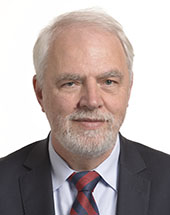Multilevel Governance for the Co-production of Urban Security
 Multilevel Governance for the Co-production of Urban Security was the topic of the latest online event co-organised by the URBAN Intergroup and the European Forum for Urban Security (Efus) on 11 February. Jan Olbrycht, President of the Intergroup, led the discussions.
Multilevel Governance for the Co-production of Urban Security was the topic of the latest online event co-organised by the URBAN Intergroup and the European Forum for Urban Security (Efus) on 11 February. Jan Olbrycht, President of the Intergroup, led the discussions.
Brigitte De Deyne, International relations officer for the City of Liège, who represented Willy Demeyer Efus’ President and the Mayor of Liège, started the event with an introduction on Efus’ work – based on regular exchanges with its more than 250 member local and regional authorities from 17 EU Member States – and objectives that nourished the activities of the European Forum for Urban Security’s Security, Democracy and Cities international conference held in Nice on 20-22 October 2021. She presented Efus’ Security, Democracy and Cities Declaration, adopted during the closing session of the above-mentioned conference, which underlines the central role of cities in designing and implementing transversal security policies with mayors as one of the central figures. Moreover, signatories of the Declaration called for investing in prevention, mobilising the most adequate and agile tools and partnerships for co-production of urban security. Multilevel governance between different actors was stressed in the document with the role for the URBAN Intergroup as a key partner. Ms De Deyne called for the support of the Member of the European Parliament to implement the Declaration’s actions.
Elizabeth Johnston, Executive Director of Efus, further specified Efus’ actions and initiatives. She underlined that the definition of security constantly evolves. That is why Efus promotes a holistic approach to urban security, which involves all local actors and citizens in the co-production of policies. It considers security as a fundamental right of all people. She also expressed that both the URBAN Intergroup and Efus would share a joint interest on the topics of environment, urban transport, housing, security of senior citizens/ageing and social issues, which can be a good basis for further cooperation between the local-regional and EU level. Elizabeth Johnston also highlighted the need and utility to jointly identify tools for EU support allowing for the implementation of actions of joint interest.
Sebastian Viano, Director Europe, Euro-Mediterranean relations & External Funding at Nice Côte d’Azur metropolitan area, together with Werner Van Herle, Head of the Prevention and Security Department, City of Mechelen, presented the Partnership on Security in Public Spaces of the Urban Agenda for the EU (UAEU). This partnership was set up in 2019 as one of the 14 thematic Partnerships of the UAEU. It is co-led by Efus, the City of Nice and the City of Madrid. They explained potential benefits that would come from partnerships that can involve local and regional authorities of all sizes.. The key areas presented during the event involved the reinforcement of social cohesion, the elaboration of agile training tools for local security actors and the safety of women in public spaces.
Metropolitan Vision for Europe 2050 – last event
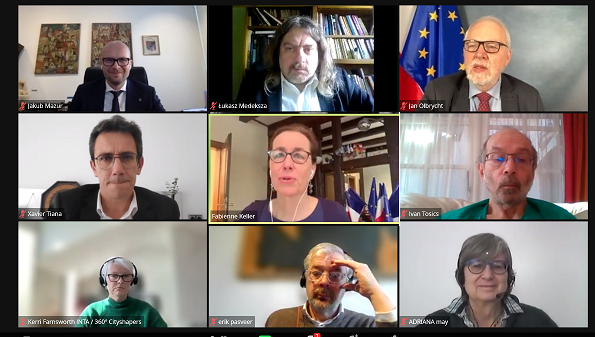 A Metropolitan Vision for Europe 2050. Resilient urban and rural transformation for a climate neutral future was the topic of the last event co-organised on January 21st by the URBAN Intergroup and METREX (Network of European Metropolitan Regions and Areas).
A Metropolitan Vision for Europe 2050. Resilient urban and rural transformation for a climate neutral future was the topic of the last event co-organised on January 21st by the URBAN Intergroup and METREX (Network of European Metropolitan Regions and Areas).
Jakub Mazur, METREX President and deputy Mayor of Wrocław in Poland, opened the event by underlying why the Metropolitan Vision for Europe 2050 is needed. He recalled that at the European Metropolitan Authorities (EMA) conference in Porto, last November, Elisa Ferreira, EU Commissioner for Cohesion and Reforms, called upon metropolitan regions and cities to come forward with proposals to address the urgent challenge of establishing a resilient and climate neutral Europe by 2050. The URBAN Intergroup of the European Parliament is an important partner to help shape this vision. Fabienne Keller, Vice-President of the URBAN Intergroup, recalled different challenges that are currently in front of the urban areas. She stressed that the level of metropolis and cities is the most efficient one to achieve ambitious climate objectives.
Henk Bouwman, Secretary General of METREX, recalled that during EU Week of Regions, METREX members started the discussion about existing examples of metropolitan projects which testimony climate adaptation. To further showcase the important role of metropolitan regions and cities, METREX has taken the initiative to answer Commission Ferreira’s call by proposing a common Metropolitan Vision for Europe 2050, including investment propositions, together with all relevant stakeholders in the field.
In her video address, Anni Sinnemäki, Deputy Mayor of Helsinki, stressed that Helsinki wants to be one of the front-runner cities in providing solutions to the fight against climate change. Decarbonisation of the heating system is the major concern as half of the city’s emissions is generated by heating. Helsinki looks at the existing solutions implemented in other cities. That is why the cooperation between cities is very important and international networks are very helpful in exchanging best practices.
Thomas Kiwitt, Planning Director, presented examples of projects implemented at the metropolitan level of Stuttgart Region. Hydrogen strategy and better accessibility and mobility were one of the several examples that climate goals cannot be achieved with isolated approaches. Cities are not an island and they need to cooperate with their surroundings. That is why metropolitan areas are the appropriate level to tackle challenges.
Presentation of the Ljubljana Agreement
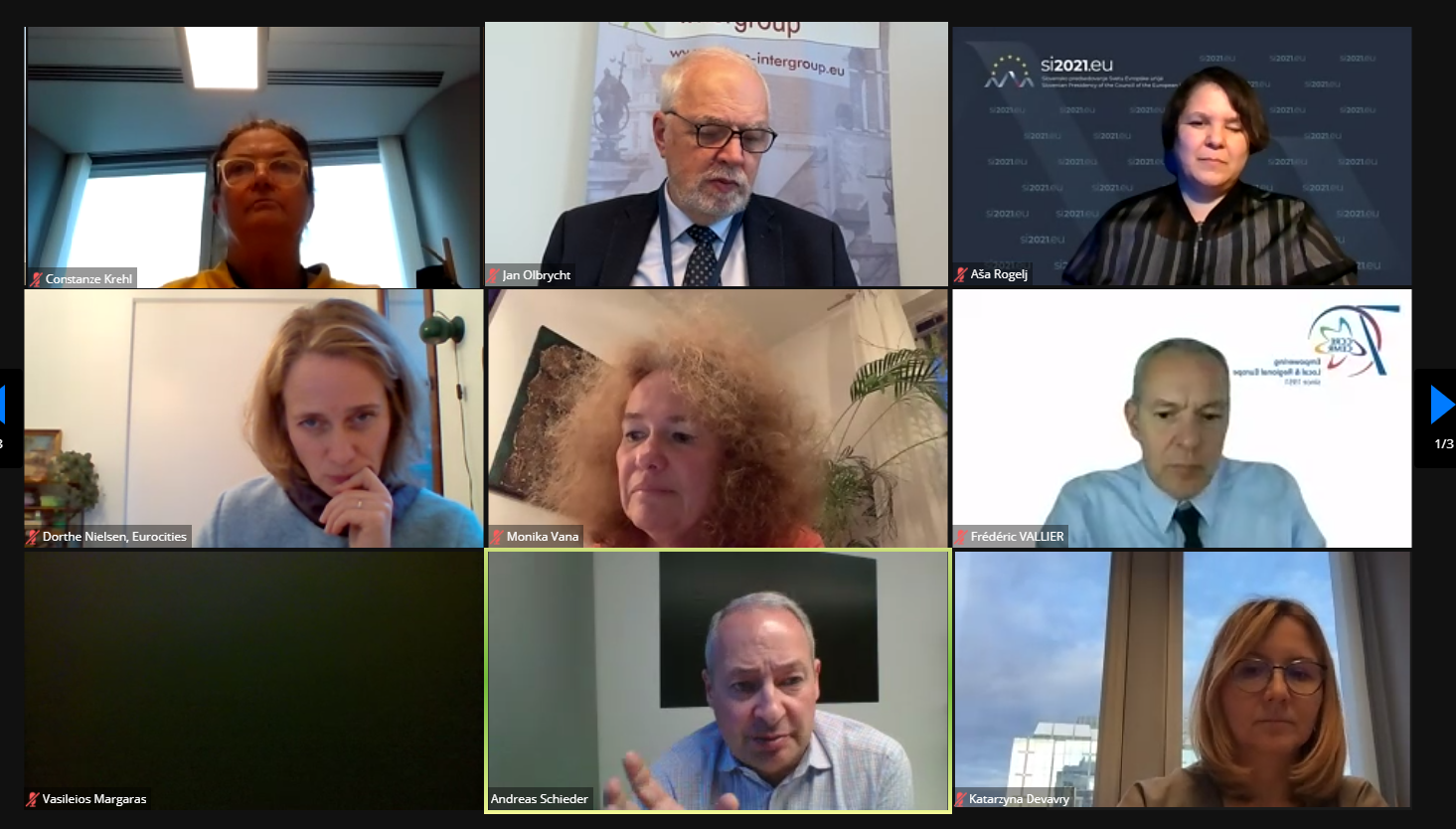 The most recent online meeting of the URBAN Intergroup was devoted to a discussion on the newly adopted Ljubljana Agreement. This Agreement and its Multiannual Working Program for the Urban Agenda for the EU were approved by EU Ministers responsible for Urban Matters on the 26th of November 2021. Both documents declare support for continuation and further development of the Urban Agenda for the EU, as well as introduces new approaches and emphasises the role of small and medium sized cities.
The most recent online meeting of the URBAN Intergroup was devoted to a discussion on the newly adopted Ljubljana Agreement. This Agreement and its Multiannual Working Program for the Urban Agenda for the EU were approved by EU Ministers responsible for Urban Matters on the 26th of November 2021. Both documents declare support for continuation and further development of the Urban Agenda for the EU, as well as introduces new approaches and emphasises the role of small and medium sized cities.
Jan Olbrycht, President of the URBAN Intergroup, opened the meeting by briefly introducing to the audience the new agreement and reminded them about the previous intergovernmental documents which focus on urban issues such as the Leipzig Charter (2007), the Riga Declaration (2015), the Pact of Amsterdam (2016), the Bucharest Declaration (2019) and the New Leipzig Charter (2020).
Next to speak was Vlad-Marius Botoș, Member of the European Parliament and Vice-Chair of the REGI committee. He underlined that promoting the urban dimension of cohesion policy, which is one of the committee’s core competences, is high up on list of committee priorities. He explained the importance of urban areas and their fight to overcome growing and complex challenges, such us their recent fight against the COVID-19 pandemic. In his opinion, the current focus should be directed at measures that might be taken to help the cities, considering their struggles caused by the fight with the virus. “The European Parliament’s Committee on Regional Development is committed to enhancing the impact of the Urban Agenda at Union level and welcomes the Ljubljana Agreement”, he added.
Asa Rogelj, Deputy Director General at the Ministry of the environment and spatial planning, representing the Slovenian Presidency of the Council of the European Union, explained the current Council priorities such as continuation of the Territorial Agenda 2030 implementation. She focused on expanding the path that led to the agreement, its structure and content. The Ljubljana Agreement is a ministerial statement of support for continuation and further development of Urban Agenda for the EU. The document introduces new approaches for strengthening UAEU and emphasises the role of small and medium sized cities. The Multiannual Working Programme for the Urban Agenda for the EU – the Next Generation is an operational framework for the cooperation in 2021 – 2026. She also presented the audience with the roadmap of planned future priorities that the European Union will focus on, leading to new partnerships and final revision of the Multiannual Working Programme for the UAEU. 4 new themes will be added to the list of existing 14 UAEU priority themes: Cities of Equality, Food, Greening Cities, Sustainable Tourism. During 2022, partnership on Greening Cities and Sustainable Tourism will be set up.
EU Mission on Climate-Neutral and Smart Cities
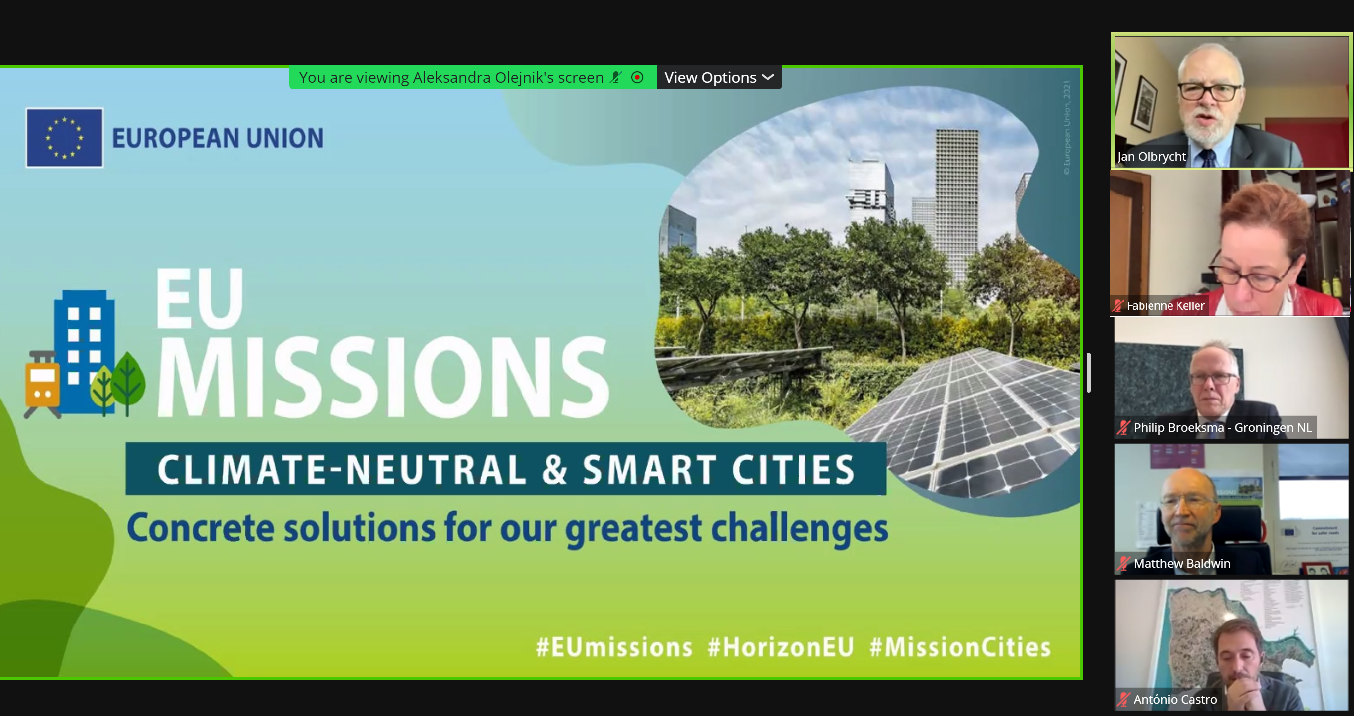 The last event of the URBAN Intergroup on 19 November was dedicated to the presentation of the EU Mission on Climate-Neutral and Smart Cities which is one of 5 Horizon Europe missions. This mission will support, promote and showcase 100 European cities in their systemic transformation towards climate neutrality by 2030 and turn these cities into experimentation and innovation hubs for all cities. This will be done through a multi-level and co-creative process formalised in Climate City Contracts, tailored to the specific situation of each city.
The last event of the URBAN Intergroup on 19 November was dedicated to the presentation of the EU Mission on Climate-Neutral and Smart Cities which is one of 5 Horizon Europe missions. This mission will support, promote and showcase 100 European cities in their systemic transformation towards climate neutrality by 2030 and turn these cities into experimentation and innovation hubs for all cities. This will be done through a multi-level and co-creative process formalised in Climate City Contracts, tailored to the specific situation of each city.
Fabienne Keller, Vice-president of the URBAN Intergroup and former mayor of Strasbourg, opened the webinar by recalling that mayors have been working very hard for many years now to reach the target of climate-neutral cities. This is a very ambitious target and the EU should support investments and actions in cities. She stressed that the EUmust help cities to provide better living environment, cleaner air, less congestion and less noise for people.
Professor Hanna Gronkiewicz-Waltz, Chair of the Mission Board for the Cities Mission and former Mayor of Warsaw, expressed satisfaction that the European Commission has adopted the Mission Board concept and largely implemented it. She explained the difference between previous EU-funded projects for the cities and this mission by underlining that the mission is not sectoral but an overarching, holistic and innovative strategy. This “Cities’ Mission” will also focus on delivering greater synergies and complementarities with other EU programs whilst helping cities to deliver on the twin objectives of the Mission: to achieve climate neutrality in 100 European smart cities until 2030; to disseminate this programme. She underlined the importance of pulling different resources and innovative solutions in order to achieve the goals.
Matthew Baldwin, Deputy Director General of DG MOVE, manager of the EU Mission on Climate-Neutral and Smart Cities, emphasised that the European Green Deal has to be Green but also a Deal. “To make it happen, it should be done for and with citizens – and this is the approach as well in the Cities’ Mission”, he said. After COP26, we start globally to move from negotiation into implementation and the Cities’ Mission might be vital as a micro action to implement the macro objectives of the European Green Deal and the EU global ambition. 75% of Europeans live in cities and it is where the European Green Deal set at EU and national level, will be implemented. The local level is where policy meets people.
Improving legislation on short-term rental platforms for a better cohabitation
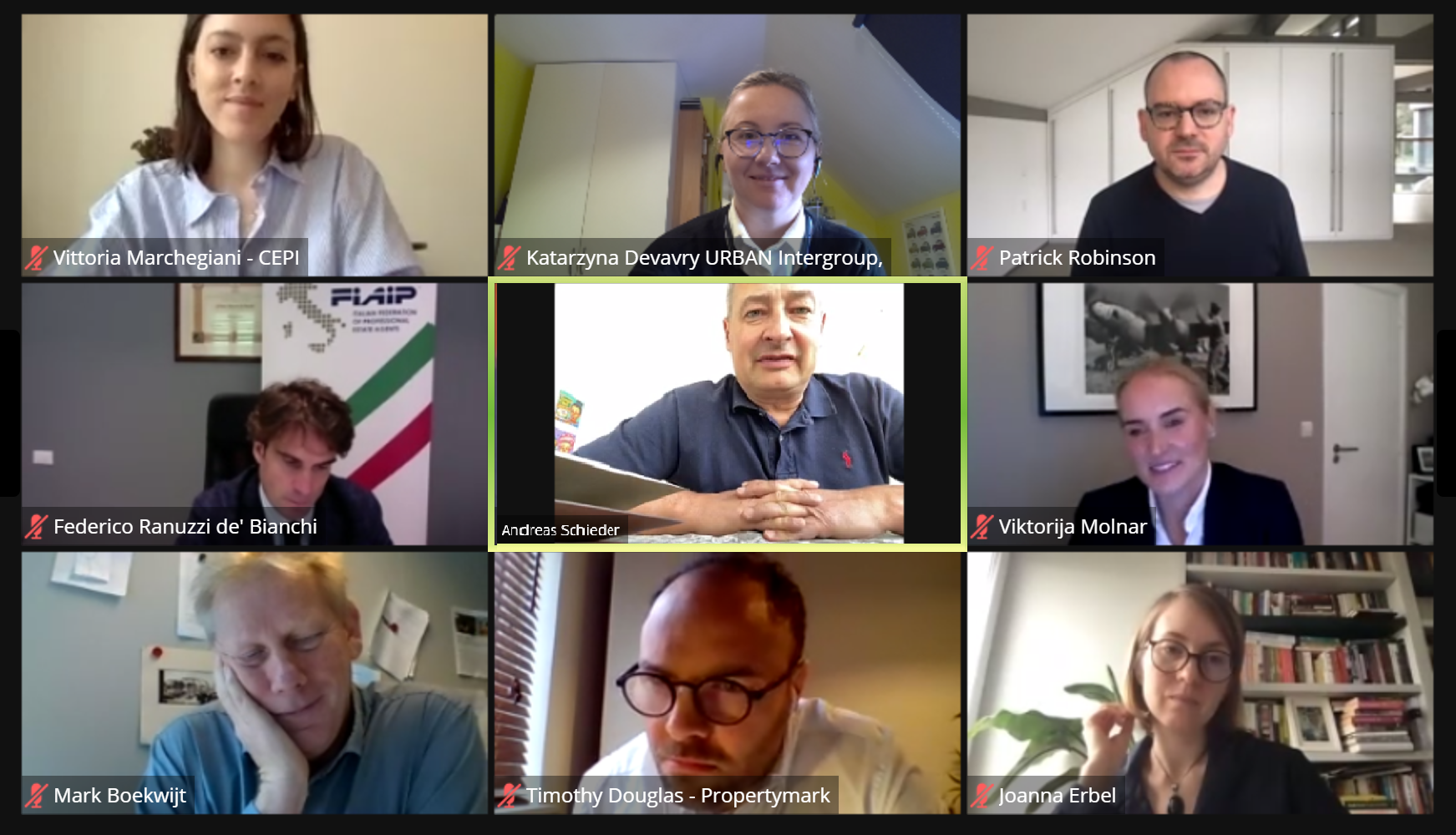
Short-term rental platforms and their impact on the real estate sector and cities in Europe was the topic of the last online seminar co-organised by the URBAN Intergroup and the European Association of Real Estate Professions (CEPI), which is also one of the Intergroup’s official partners.
Jan Olbrycht, President of the URBAN Intergroup, opened the seminar by welcoming the discussion and clarified the importance of the phenomenon of short-term rental platforms and its impact on tourism, housing and the real estate sector in general, as well as on urban developments in European cities.
Elisabeth Rohr -de Wolf, CEPI Secretary-General, underlined that the European Association of Real Estate Professions (CEPI) was happy to co-organise this session on short-term rental platforms (STRs) together with the URBAN Intergroup as it brought together many of the key players involved in the field enabling all to discuss the different challenges and opportunities surrounding STRs. In her opening address, Elisabeth Rohr -de Wolf, underlined that CEPI does not intend to promote a pro/anti narrative in this field. She suggested the need for a better understanding of this relatively new ecosystem, highlighting the requirement to study its potential in the sharing economy, as well as ensuring that appropriate regulation remains in place for the benefit of all. The ultimate aim, she concluded, is not to discriminate against alternative business models but to ensure a level playing field for all involved parties.
During the first panel discussion, Federico Ranuzzi de’ Bianchi, CEPI Vice-President (FIAIP, Italy), recalled that the short-term rental system is not only proposed by big online platforms but by real estate agencies as well. This type of rentals, in fact, is not only destined to tourists but it is also relevant for mobile workers and students. Luis de Prado, CEPI Vice-President (CGCAFE, Spain), underlined the need for reflection on how real estate and property management agencies on one side, and online short-term rental platforms on the other, could beneficially co-exist on the market. He emphasised that platforms should encourage their customers to respect rules concerning the quality of life of inhabitants and that more control of customers’ inappropriate behaviours should be put in place in order to avoid potential conflicts in the buildings. He called for a better organisation of this section of the rental market in order to find the best ways of coexistence between different operators.


